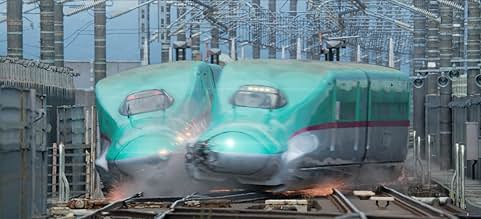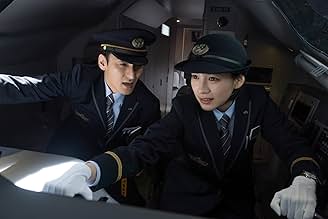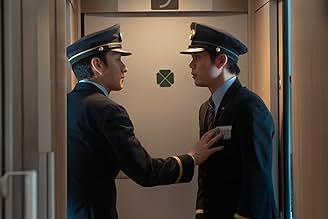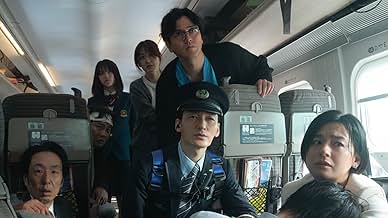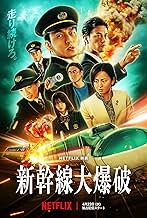A group who straps bombs to a Japanese bullet train in an attempt to extort money from the government.A group who straps bombs to a Japanese bullet train in an attempt to extort money from the government.A group who straps bombs to a Japanese bullet train in an attempt to extort money from the government.
Featured reviews
Critics are dumb for comparing this with Speed (1994). This is a sequel to the movie Bullet Train (1975).
Besides the explosion plot, the stories are entirely different.
Overall, this was an enjoyable action film, made for the big screen, with clever scenes and twists.
It brings new ideas to the "train" disaster genre, which are much appreciated and make everything engaging.
The performance of the main leads is solid.
Despite a few plot holes and some slightly bad acting in supporting roles, the movie carries a great intensity that keeps you hooked from the beginning to the end.
If you enjoy train movies, you will like this!
Besides the explosion plot, the stories are entirely different.
Overall, this was an enjoyable action film, made for the big screen, with clever scenes and twists.
It brings new ideas to the "train" disaster genre, which are much appreciated and make everything engaging.
The performance of the main leads is solid.
Despite a few plot holes and some slightly bad acting in supporting roles, the movie carries a great intensity that keeps you hooked from the beginning to the end.
If you enjoy train movies, you will like this!
If you're looking a lazy afternoon-watch this weekend that doesn't want you to think too much, this Japanese-version of 'Speed' but on a Bullet Train might be worth considering.
The film was fairly decent until the major reveal that was not really convincing at all, but if you forceful yourself to apply the logic you often see in the news about 'bad actors', you could maaaaybe see why/how it all makes sense.
But like I said, if you don't want to think too much, or at all, this might be one of the decent films for this weekend, or even for passive viewing as you do the dishes or fold your clothes away. Could have been so much better but I didn't care that it was not that and it doesn't feel like a let down.
The film was fairly decent until the major reveal that was not really convincing at all, but if you forceful yourself to apply the logic you often see in the news about 'bad actors', you could maaaaybe see why/how it all makes sense.
But like I said, if you don't want to think too much, or at all, this might be one of the decent films for this weekend, or even for passive viewing as you do the dishes or fold your clothes away. Could have been so much better but I didn't care that it was not that and it doesn't feel like a let down.
Japanese is still Japanese. Even though they have great material, the results made me frustrated. First I saw the trailer, it seemed like the movie from 90s - Speed, Keanu Reeve and Sandra Bullock - a Japanese version. I had high expectation due to the explosion was about their high speed technology train like Shinkansen bullet train that serves many people daily. During the line, I was getting upset by boring dialog, drama-with-no-reason made me sick, and overall was pretty disappointed. The signature of Japanese movie is about their spirit, responsibility, patriotism etc. But those built overall movie worsen.
The villain supposed to hit my nerve and made me stunned, but no. There was not solid and believable; or AKA enough to convince; the motive of making the train exploded.
The villain supposed to hit my nerve and made me stunned, but no. There was not solid and believable; or AKA enough to convince; the motive of making the train exploded.
Not only was the story intense, but I really loved how they showcased the technical operations of the Tohoku Shinkansen - from the control room decisions to the real-time communication between the operator, conductor, and driver. It all felt incredibly authentic, like watching real professionals in action. Their calmness, precision, and teamwork during high-stress moments really stood out and added so much depth. As a Shinkansen otaku, seeing those accurate procedures and behind-the-scenes details was an absolute thrill and made the experience even more enjoyable. The attention to detail was remarkable.
I just finished watching Netflix's new "Bullet Train Explosion" (2025) and couldn't help but notice all the comments claiming it's "just a Speed ripoff." Oh, sweet summer children of cinema...
For those whose film history knowledge apparently begins with Keanu Reeves, allow me to enlighten you: "Shinkansen Daibakuha" isn't copying Speed (1994). It's a REBOOT of the ORIGINAL "Shinkansen Daibakuha" from 1975 - a Japanese disaster thriller released NINETEEN YEARS BEFORE "Speed" even existed.
That's right. The "can't slow down or it explodes" concept that everyone associates with "Speed" was actually pioneered by this Japanese film starring Ken Takakura, Sonny Chiba, and other legendary Japanese actors nearly two decades earlier. The original featured Japan's bullet train that would explode if it dropped below 80km/h, with criminals demanding ransom money.
So who copied whom? If anything, "Speed" borrowed from Japan, not the other way around. Shinji Higuchi's new Netflix adaptation is simply bringing a Japanese classic back to life for a new generation.
The irony of Western viewers accusing a Japanese reboot of copying an American film that may have been "inspired" by the original Japanese concept is absolutely delicious. It's the perfect embodiment of that meme where someone makes a joke, someone else says it louder, and gets all the credit.
For those whose film history knowledge apparently begins with Keanu Reeves, allow me to enlighten you: "Shinkansen Daibakuha" isn't copying Speed (1994). It's a REBOOT of the ORIGINAL "Shinkansen Daibakuha" from 1975 - a Japanese disaster thriller released NINETEEN YEARS BEFORE "Speed" even existed.
That's right. The "can't slow down or it explodes" concept that everyone associates with "Speed" was actually pioneered by this Japanese film starring Ken Takakura, Sonny Chiba, and other legendary Japanese actors nearly two decades earlier. The original featured Japan's bullet train that would explode if it dropped below 80km/h, with criminals demanding ransom money.
So who copied whom? If anything, "Speed" borrowed from Japan, not the other way around. Shinji Higuchi's new Netflix adaptation is simply bringing a Japanese classic back to life for a new generation.
The irony of Western viewers accusing a Japanese reboot of copying an American film that may have been "inspired" by the original Japanese concept is absolutely delicious. It's the perfect embodiment of that meme where someone makes a joke, someone else says it louder, and gets all the credit.
Did you know
- TriviaThe 109 terror case that the TMPD boss and JR officials constantly references is named after the HIkari 109 bullet train that was threatened with a bomb in the original 1975 Bullet Train movie. The Hikari train is one of the original 1964 Shinkansen trains still in service on the Tokaido to San'yo lines. Before it was part of the Shinkansen service, the Hikari was an express train until 1958. It was considered the fastest train in Shinkansen line until Nozomi trains in 1992.
- ConnectionsRemake of Super Express 109 (1975)
Details
- Release date
- Country of origin
- Official site
- Language
- Also known as
- Pánico en el tren bala
- Filming locations
- Production companies
- See more company credits at IMDbPro
- Runtime
- 2h 14m(134 min)
- Color
- Sound mix
- Aspect ratio
- 2.35 : 1
Contribute to this page
Suggest an edit or add missing content



